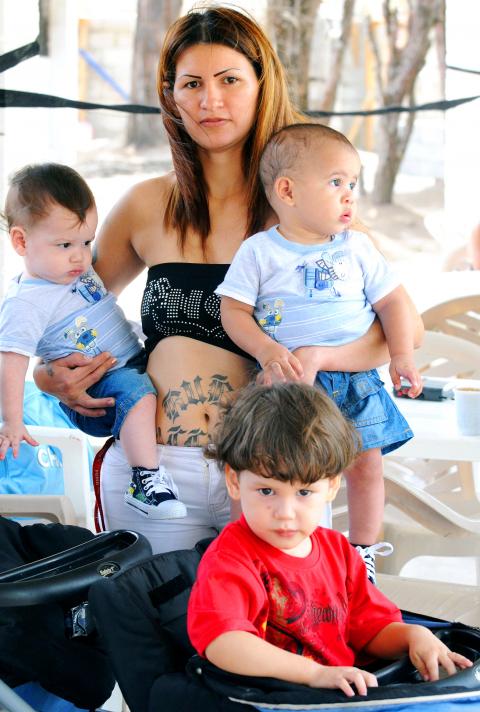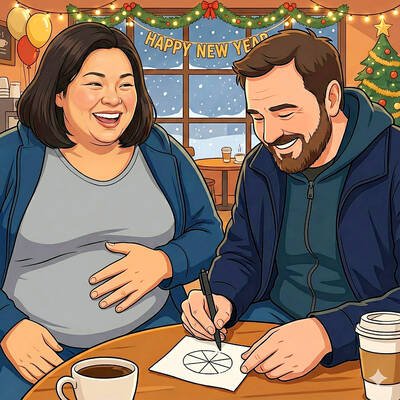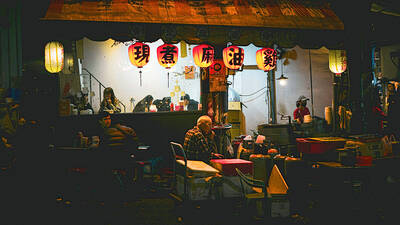“Would you still have children if you were given a second chance?” About 24 percent of the mothers that participated in a recent survey answered “no” when asked this question, and the less happy a mother was, the more likely she was to say “no.”
Mother’s Day was just around the corner when Chao Tien-lin, a Democratic Progressive Party (DPP) candidate to the legislature, and Greater Kaohsiung City Councilor Chen Hsin-yu published the results of the survey on April 25. The survey was conducted between April 19 and 21 by telephone, interviewing 1,344 mothers from various cities and counties throughout the nation.
Among the interviewed mothers, 67 percent of them believed they were “happy as a mother,” while 16 percent were “unhappy as a mother,” and 15 percent were “equally happy and unhappy as a mother.”

Photo: AFP
照片:法新社
Distinguishing between different age groups, the younger the mother was the happier she tended to be as a mother. Geographically, an average of 70 percent of mothers living in Taipei City, New Taipei City and Keelung City, as well as Taoyuan, Hsinchu and Miaoli counties were “happy” as mothers, which was a far higher percentage than other areas across the nation.
Twenty-four percent of the interviewees said “no” when asked “Would you still have children if you were given a second chance?” As many as 48 percent of the “unhappy” mothers answered “no” while 15 percent of the “happy” mothers also gave a negative response.
Among the mothers who answered “no,” 37 percent of them said that the decision would ease their economic burden, while 29 percent said raising a child was too “difficult,” and 16 percent said it was because they desired a “less restriced lifestyle.” Meanwhile, five percent of them were concerned that they would not be able to endure the pain of losing their child in the future. Chao Tien-lin said that a heavy economic burden and feeling exhausted that comes with taking care of a child are the main factors influencing a mother’s decision about having children.
(LIBERTY TIMES, TRANSLATED BY TAIJING WU)
「重新選擇,會不會生小孩?」民調顯示約有百分之二十四的母親回答「不會」,且越不快樂的母親回答「不會」的比率越高。
母親節前夕,民進黨立委參選人趙天麟與高雄市議員陳信瑜上週一公布民調,該民調於四月十九日至二十一日進行電話訪問,有效樣本為一千三百四十四名全國各縣市母親。
百分之六十七的受訪母親覺得「當媽媽快樂比較多」、百分之十六認為「不快樂比較多」、百分之十五認為「快樂與不快樂皆有」。
以年齡層區分,年紀越輕的母親認為快樂的比率越高;若以地區區分,北北基與桃竹苗的母親快樂比率較高,平均達百分之七十。
問到「重新選擇,會不會生小孩?」高達百分之二十四的母親選擇「不會」,其中覺得不快樂的母親回答「不會」比率高達百分之四十八,即使自認為快樂的母親,也有百分之十五選擇「不會」生小孩。
在回答「不會」生小孩的母親中,百分之三十七的母親認為經濟負擔可降低、百分之二十九覺得養孩子辛苦、百分之十六認為生活會比較自在、百分之五則擔心會承受失去小孩的痛苦。趙天麟指出,沉重的經濟壓力與精疲力竭照顧是母親選擇會不會生小孩的主因。
(自由時報記者侯承旭)

★ Bilingual Story is a fictionalized account. 雙語故事部分內容純屬虛構。 “Any New Year’s resolutions?” he asked. Lena put her coffee down. “Yeah,” she said. “To get in shape.... round is a shape, right?” Mark chuckled. “I support this. Fully achievable. Low risk.” “Thanks,” she smiled and lovingly rubbed her round belly. “I like a resolution I can’t fail.” “Funny thing is, I was thinking about getting round too.” Lena nodded her head in approval, “You could put some meat on those skinny bones of yours.” Mark shook his head, “Not that kind of round. Wheel-of-Life round.” She raised an eyebrow.

Skating is a popular recreational and competitive activity that involves sliding over surfaces using specially designed footwear. Its origins date back over 1,000 years to Northern Europe, where people first strapped animal bones to their feet to move across frozen lakes and rivers. In the 17th century, the Dutch transformed skating into a leisure activity. They also replaced bone blades with metal, leading to the creation of modern ice skates. Today, ice skating is enjoyed as a global sport and an exciting pastime by people of all ages. Figure skating is one of the best-known and most graceful forms of skating.

對話 Dialogue 清清:最近天氣越來越冷,感覺很容易感冒,要不要一起去吃薑母鴨或是羊肉爐? Qīngqing: Zuìjìn tiānqì yuèláiyuè lěng, gǎnjué hěn róngyì gǎnmào, yào bú yào yìqǐ qù chī jiāngmǔyā huòshì yángròulú? 華華:最近我覺得有點累,想吃薑母鴨,可是又怕一下子吃太補會上火。 Huáhua: Zuìjìn wǒ juéde yǒudiǎn lèi, xiǎng chī jiāngmǔyā, kěshì yòu pà yíxiàzi chī tài bǔ huì shànghuǒ. 清清:那我們去喝香菇雞湯吧,不太容易上火,喝了也會很暖和。 Qīngqing: Nà wǒmen qù hē xiānggū jītāng ba, bú tài róngyì shànghuǒ, hē le yě huì hěn nuǎnhuo. 華華:聽起來不錯!你們家平常冬天都吃什麼進補? Huáhua: Tīng qǐlái búcuò! Nǐmen jiā píngcháng dōngtiān dōu chī shénme jìnbǔ? 清清:我家都煮麻油雞,吃完整個人手腳都會熱起來。我也很久沒喝香菇雞湯了,正好可以去打打牙祭。 Qīngqing: Wǒ jiā dōu zhǔ máyóujī, chī wán zhěnggè rén shǒujiǎo dōu huì rè qǐlái. Wǒ yě hěn jiǔ méi hē xiānggū jītāng le, zhènghǎo kěyǐ qù dǎ dǎ yájì. 華華:可是我最近在減肥,會不會吃得太補,肉又長回來了? Huáhua: Kěshì wǒ zuìjìn zài jiǎnféi, huì bú

A: South Korea’s Golden Disc Awards ceremony is taking place at the Taipei Dome on Saturday. Eighteen acts are taking to the stage, including Blackpink’s Jennie. B: The hottest boy group CORTIS is also performing. I can’t wait to see James, the Taiwanese member of the band, perform. A: Who else are playing at the K-pop show? B: This year’s lineup is stacked, including: Allday Project, ARrC, Ateez, Boynextdoor, Close Your Eyes, Enhypen, IVE, Izna, KiiiKiii, Le Sserafim, Monsta X, NCT Wish, Stray Kids, TWS, Zerobaseone and Zozazz. A: SKZ, Enhypen and Ateez dominated Billboard’s 2025 Year-End World